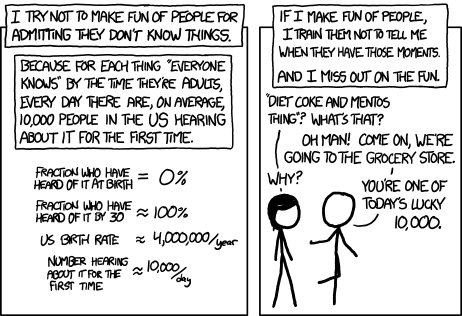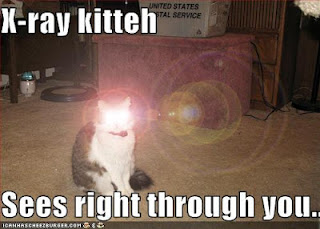Given the popularity of my inaugural
Crank of the Week post last week, I've decided that I'll need to spend some more time examining Michael Tellinger's claims more closely.
One thing: I'm not going to spend any money buying his books. I'm going to rely on the material he makes free on the Internet (of which there is a lot) and syntheses of his ideas from sources I trust.
 |
| Pictured: Buyer's Remorse |
If you think my analyses could benefit from having his books around, I welcome donations to that end. If you bought a copy of
Slave Species of God, which you're embarrassed to have sitting on your bookshelf, but can't bring yourself to throw away, here's your opportunity to get rid of it. Ideally I'd prefer an electronic copy though, if such a thing exists.
If you'd like to do that, drop me a message on
Google+ and we'll make arrangements.
Right, with that out of the way, let's get started.
One of the claims that both Tellinger, and his intellectual progenitor
Zecharia Sitchin, promote is that of a geographic pole shift caused by a gravitational interaction with the planet Nibiru 10 000 years ago or so. This claim doesn't exist in isolation, however - it's taken as fact (by them) in supporting many of their other claims.
So if we were to show this claim to be false, the rest of them should all come tumbling down like a house of cards. Getting them to admit that would be another matter altogether.
Why Do They Make This Claim?
As far as I can tell, the genesis of this idea is in the book of Genesis itself. (lol! See what I did there?)
The premise here is that ancient mythology should be read as if it's historical fact. Since the book of Genesis contains a story in which the whole world was flooded, that must, in fact, have happened.
So what could cause a global flood? Rain wouldn't do it, because there isn't enough water to achieve it. No, the only possible cause is a tsunami bigger than any tsunami ever recorded - one capable of travelling thousands of kilometers inland and engulfing, basically, everything.
 |
| Way, WAY bigger than this |
And what could have caused such a tsunami? The sudden displacement of large bodies of water.
(By now you should be starting to see the tenuous nature of Tellinger & Sitchin's logic - an idea is postulated, then taken as the factual basis for the next idea, which is then the basis for the next, and so on. But we're not there yet, so let's get back to it.)
And what could have caused such displacement? A sudden, violent event that caused the ice caps of the Earth to simultaneously shift loose from their positions, crashing into the sea and instantly melting.
What could have caused that? A violent, geographic pole shift.
A What?
Basically this is when the geographic pole, the axis along which the planet spins, changes. Sounds feasible, right? I mean, why shouldn't that happen?
The Physics
So could a gravitational interaction with planet Nibiru cause a
polar shift?
Nope.
First, there's no planet Nibiru. But I'll deal with that in more detail in a future post. For argument's sake, let's presume that it does exist. Time to put on your Let's Pretend Hat. Ready? Okay.
 |
The silliness of the hat is
directly proportional to
the silliness of the claim. |
Problem is, gravity just doesn't work that way. In order to cause the Earth's crust to shift around like that, the gravitational field from the other planet would need something to 'grab onto': a structure of significant mass that would make the planet irregular in shape. Although the Earth does bulge a little at the equator, the variance there just isn't enough to provide the torque necessary to move anything. You'd need a mountain several orders of magnitude taller than Mount Everest (or even
Olympus Mons - the tallest mountain in the solar system). And
there's no way a mountain that large could ever have existed on Earth.
So what could do it? Well, according to Dr Stuart Robbins of the
Exposing PseudoAstronomy blog and podcast, you could only do this if you had something like a
tractor beam from
Star Trek: a highly focussed gravitational (or whatever) field aimed specifically at one part of the planet.
And since there's no known mechanism for such a device, and since there's no apparent reason why any super-advanced civilisation (they'd have to be considerably more advanced than Sitchin's Annunaki are supposed to be - a
Type II civilisation, or close to it) would want to do that, I think we can safely dismiss that notion.
A quick point here, the geographic pole has
wandered a bit over time. Between that and
plate tectonics, we know that the polar axis hasn't always been where it is now, in relation to the continents as they are today. But these changes are small and very, very slow. Certainly not significant in recent prehistory, or even since the first humans evolved.
Also, we should be careful not to confuse the notions of a
geographic pole shift, which doesn't happen, and a
magnetic pole reversal, which happens all the time - geologically speaking. A magnetic pole shift couldn't cause any flooding at all, and probably wouldn't even have been noticed by humans before the
discovery of magnetism and the
invention of the magnetic compass.
The Evidence
So what actual evidence is there that such a thing happened.
Well, there's the book of
Genesis, the
Epic of Gilgamesh,
Unu Pachakati,
Tiddalik,
Khun Borom... and so on. The ancient world is full of
flood myths, which Sitchin/Tellinger suggests (and then assumes to be fact) is evidence that there was, in fact, a global flood catastrophe - and that those myths are the historical retelling of that event.
Sounds plausible on the surface, right?
Sure it does. Except for the fact that there's no physical evidence supporting that notion. None whatsoever. Sure, people like
Graham Hancock put forward silly notions about weathering on the Sphinx and such, but none of those are accepted by people who know what they're talking about.
So how is it that all these cultures seem to share the same myth?
Well, here's the thing: human communities tend to be near water. We need fresh water to drink, and the ocean provides a ready supply of food, as well as migratory and trading opportunities. When you live close to water, there's one thing that's certain: you're going to have to deal with things like floods and tsunami from time to time. Given how destructive and often surprising these events can be, it only stands to reason that those people would record those events in their oral and written traditions.
Does that mean that all those myths
must be describing the same event? Nope. Each myth could be describing a separate event, or could even consist of fictionalised or combined accounts of multiple events, rolled into one. Most of these cultures probably experienced multiple catastrophic floods in their times. Also, as cultures move, conquer or are conquered by others, and share their stories with each other, it also stands to reason that their similar myths would blend together over time. This goes a long way to explaining why, for example, the different middle-eastern flood myths are so similar in form, even if they're different in the details.
It also explains why cultures that don't come from near major water sources tend not to have flood myths.
In fact, the notion of a global flood that affected everyone everywhere is, in itself, impossible. Even though most of the Earth's surface is covered in water, there
isn't really all that much water on the surface, relatively speaking. Even if the ice caps melted completely, there still wouldn't be enough water to
cover everywhere.
 |
| See all those bits that aren't blue? |
So Where Does That Leave Us?
Well, given that there's no reason to believe that there was ever a global flood, there's no reason to postulate a cause for said flood.
The premise is false, the hypothesis makes no sense, the evidence is misinterpreted (or just made up) and the theory is bogus. There's no reason to accept any of it, and the whole thing, from start to finish, is pure fiction.
Jenga!
In other words, when it comes to the ideas of a global flood and a geographic pole shift, Michael Tellinger is wrong.









































